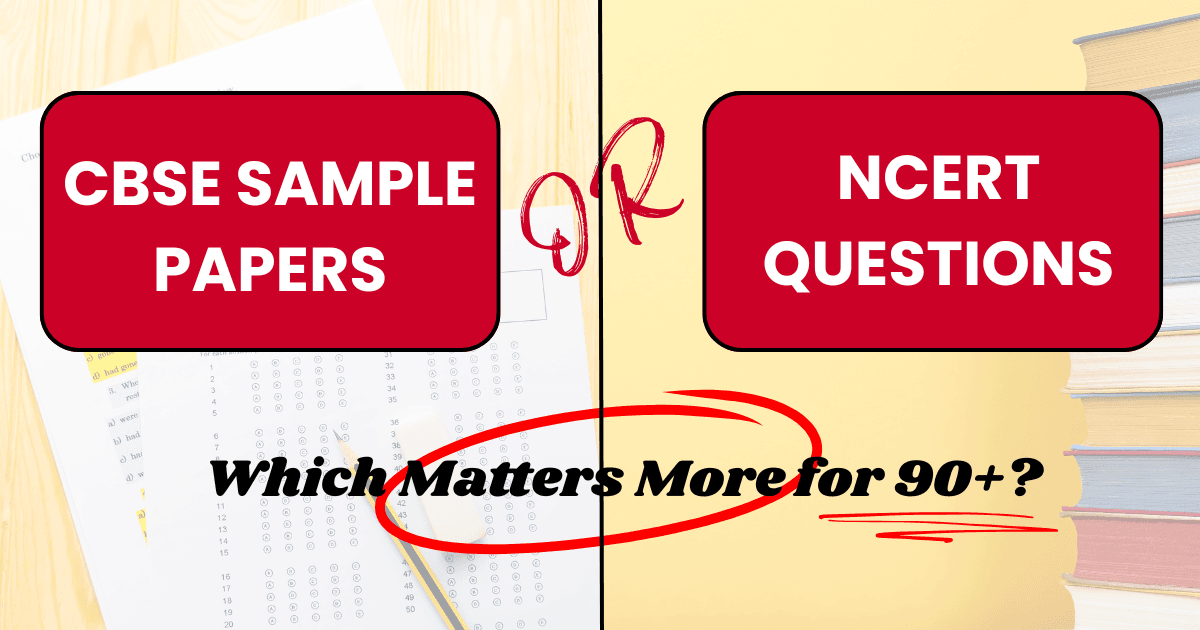When exams are around the corner, most students face one common doubt: Should I focus more on CBSE sample papers or NCERT questions? Both are important, but their purpose and role in exam preparation are slightly different. And if you’re also confused about whether to stick to NCERT or practice more sample papers, this article will clear it up for you and show exactly how to balance both without stress.
Why are NCERT Questions Considered the Base?
For every CBSE student, NCERT textbooks are the foundation. Whether it’s Class 10 or Class 12, almost all exam questions are directly or indirectly linked to the NCERT.
- Direct Questions: Many times, exam papers lift questions word-for-word from NCERT exercises as well as in-text questions.
- Concept Clarity: NCERT is the best resource to build strong fundamentals. If your concepts are clear, solving advanced questions becomes easier.
- Board Relevance: CBSE has clearly mentioned that NCERT textbooks are the primary source for paper-setting.
For example: In Class 12 Physics, a numerical on current electricity might look slightly twisted in the exam, but its base concept is usually from NCERT.
So, skipping NCERT is like building a house without a strong foundation, risky and incomplete.
Why CBSE Sample Papers Are Equally Crucial
While NCERT gives you clarity, sample papers prepare you for the real test. CBSE releases official sample papers every year, and several publishers also provide practice sets.
- Exam Pattern Familiarity: Sample papers help you understand the latest paper format, question types, and marking scheme.
- Time Management: Solving them under exam conditions helps you practice completing the paper within 3 hours.
- Application of Knowledge: Even if you know all NCERT concepts, applying them in tricky or case-based questions requires practice.
For example: In Class 10 English, you may know grammar rules from NCERT, but only sample papers give you real practice with unseen passages or letter-writing under time pressure.
Main Differences Between NCERT Questions and Sample Papers
| Aspect | NCERT Questions | CBSE Sample Papers |
| Purpose | Build foundation, clarify concepts | Practice exam pattern, application of concepts |
| Question Type | Straightforward, concept-based | Mixed – direct, twisted, case-based, HOTS |
| Frequency in Exams | Frequently appear (direct or modified) | Reflect the upcoming exam style |
| When to Use | At the start of preparation | After syllabus completion, during revision |
| Best For | Understanding basics | Boosting confidence & speed |
| Score Impact | Helps secure direct marks | Helps push scores higher by preparing for tricky/case-based questions |
Which One Should You Focus On More: CBSE Sample Paper vs. NCERT Questions
The answer is both, but at different stages of preparation.
- Start with NCERT:
- Finish all chapters thoroughly.
- Solve each exercise question at least twice.
- Highlight important definitions, theorems, and diagrams.
- Move to Sample Papers:
- Once NCERT is done, start solving sample papers.
- Attempt them in exam-like conditions (3 hours, no breaks).
- Analyze mistakes and revise weak areas.
- Balance According to Subject:
- Science & Maths: NCERT first for basics, then sample papers for application.
- English & Social Science: Sample papers more useful to practice writing skills and structuring answers.
- Accountancy/Economics: NCERT for concepts, sample papers for solving case studies and numerical.
Can I skip NCERT and directly solve sample papers?
Not recommended. Without NCERT, your basics may be weak, and tricky questions will confuse you. NCERT helps you to cover the complete syllabus, while sample is just to test your preparation. You cannot prepare with sample papers. For preparation, you have to go with NCERTs.
Are questions in board exams tougher than NCERT?
Not exactly tougher, but often modified or case-based. If you’ve mastered NCERT + practiced sample papers, you’re well-prepared.
Is NCERT enough to score above 90 in boards?
NCERT is the backbone and will help you score most of the direct marks. But to cross 90, you also need sample papers for speed, confidence, and handling new question patterns.
Common Mistakes Students Make
- Relying only on sample papers without completing the NCERT
Many students jump straight into sample papers without properly going through the NCERT. This weakens their foundation, as NCERT often covers the basics that form the core of exam questions. - Ignoring NCERT examples
Students sometimes focus only on the exercises and skip the examples in the NCERT. However, examples are designed to explain concepts step by step and often form the base for exam-style questions. - Practicing sample papers casually without time management
Solving sample papers without setting a time limit makes no sense. The real value comes when you attempt them in an exam-like environment to test your speed and accuracy. - Not reviewing mistakes after practice
Many students finish a paper and move on without analyzing their mistakes. Reviewing errors is essential to avoid repeating them and to strengthen weak areas.
Also See: Class 10 Resources
- CBSE Class 10 Syllabus 2025-26
- NCERT Underlined PDFs
- Class 10 Notes
- Class 10 Important Questions Answers
- Class 10 Sample Papers
- Class 10 MCQs
- Class 10 PYQs with Solutions
Also See: Class 12 Resources
- CBSE Class 12 Syllabus 2025-26
- NCERT Underlined PDFs
- Class 12 Notes
- Class 12 Important Questions Answers
- Class 12 Sample Papers
- Class 12 MCQs
- Class 12 PYQs with Solutions
Smart Preparation Strategy (Step by Step)
- Complete the NCERT first. Don’t leave any back exercise questions.
- Revise NCERT summaries. They’re excellent for last-minute revision.
- Start with CBSE’s official sample paper. It’s the most reliable.
- Solve 1 paper per week (Class 10) or 2 papers per week (Class 12).
- Evaluate your answers honestly. Use marking schemes to understand where you lose marks.
- Track your progress. If your score improves with each paper, you’re on the right track.
Takeaway for Students
Think of NCERT and sample papers like two sides of the same coin. One builds your knowledge, the other tests your ability to use it. If you prepare smartly by combining both, cracking CBSE exams becomes much easier.
Final Verdict
- NCERT questions = Must for concept clarity and scoring direct marks.
- Sample papers = Must for exam readiness, time management, and confidence.
If you had to choose, NCERT comes first, because without it, you can’t solve sample papers effectively. But for scoring above 90%, a combination of both is essential.
Remember, every hour you put into practice brings you one step closer to your goal. Stay consistent, believe in your efforts, and the results will follow.








